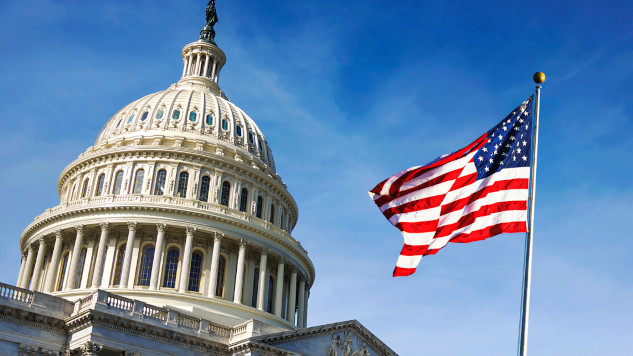
In this Article:
- Will the 2024 U.S. election decide the future of democracy?
- How has political polarization reached such dangerous levels?
- Could the Twelfth Amendment play a role in the election outcome?
- Is the judiciary still a safeguard for democracy?
- Can the U.S. recover from growing authoritarianism?
- Will the 2024 election lead to the dissolution of the United States?
Will the 2024 U.S. Election Decide Between Democracy and Autocracy?
by Robert Jennings, InnerSelf.com
In the annals of American history, few elections stand out as turning points—moments when the nation itself seems to hang in the balance, teetering between vastly different futures. The 2024 presidential election promises to be one of these pivotal moments. But as we approach this fateful day, we must ask ourselves: Will the United States emerge from the election as a more robust democracy, or will it fall into the hands of authoritarian forces? What kind of country do we want to be, and what will it take to preserve the principles that have guided us for over two centuries?
The stakes are undeniably high. On one side, we see Kamala Harris, the current vice president, representing the continuation of democratic norms, the rule of law, and the promise of progress. On the other side, we face the return of Donald Trump, a figure who has shown disdain for these democratic principles, leading many to believe that a second Trump presidency could end America as we know it. The question we must ask is simple yet profound: What kind of future will we choose?
The Power To Divide A Nation
How did we get here? How did the land of the free, the beacon of democracy, find itself so deeply divided? Political polarization has always existed to some degree in the United States, but today, the rift feels different—more profound, more personal, more dangerous. The divisions no longer reflect differing policy preferences or ideological leanings. They are fueled by something far more destructive: a deliberate campaign to pit Americans against one another, stoked by foreign actors and, at times, amplified by our leaders.
These divisions are not an accident. They have been nurtured, exploited, and deepened by authoritarian regimes around the world, who see an opportunity in the growing cracks within American society. Through sophisticated propaganda campaigns, these regimes have sown seeds of mistrust, anger, and division, creating a fertile ground for extremism to flourish. But here’s the question: Can we reverse this trend before it’s too late?
Polarization is the weapon of choice for those who seek to undermine democracy. It weakens us from within, making it harder to engage in constructive dialogue, find common ground, and believe in the possibility of progress. It turns neighbors into enemies and convinces people that compromise is a betrayal of their values. But as we stand on the edge of the 2024 election, we must ask ourselves: Is this the path we want to continue? Or can we, as a nation, find a way back to a place of unity and shared purpose?
Democracy or Autocracy?
So, what is this election really about? Is it just a choice between two political figures, or is it something more? The truth is, the 2024 election is not just about policy differences or partisan politics. It is a referendum on the future of American democracy itself. Will we continue to be a nation that values the peaceful transfer of power, or will we drift into the dangerous waters of autocracy, where power is concentrated in the hands of a few, and the voices of the many are silenced?
And here’s the critical question: What happens if Trump wins again? Will it be through legitimate electoral means, or is there a more dangerous strategy at play—one that seeks to manipulate the system, sow confusion, and ultimately undermine the will of the people? These are not abstract concerns. They are the genuine dangers we face as we approach the most consequential election of our time.
The Twelfth Amendment: A Pathway to Power?
Most Americans are unfamiliar with the Twelfth Amendment to the Constitution, but it could become important in the 2024 election. The amendment was designed to resolve disputes in the Electoral College, providing a mechanism for choosing the president if no candidate receives a majority of electoral votes. But what if this amendment, intended as a safeguard, becomes a tool for those seeking to subvert the democratic process? What if, like in the infamous 1876 election, political maneuvering and backroom deals determine the next president?
Could Donald Trump be eyeing a repeat of that history? In 1876, the election between Rutherford B. Hayes and Samuel J. Tilden was decided not by the voters but by a deal struck in Congress after disputed electoral results from several states. Could we see a similar scenario unfold in 2024? Imagine a situation where state legislatures in crucial battleground states, controlled by Trump loyalists, send alternate slates of electors to Congress, challenging the certified results. What then?
The Constitution provides a process for resolving such disputes, but it is a process that could be manipulated to produce an undemocratic outcome. The Twelfth Amendment gives the House of Representatives the power to decide the election if no candidate wins a majority in the Electoral College. But here’s the catch: In that scenario, each state delegation gets one vote, regardless of population. What would that mean in a politically divided country, where a few states could determine the outcome, even if most Americans voted for a different candidate?
Is this the kind of democracy we want? A system where the people's will can be overridden by political gamesmanship? The mere possibility of such a scenario should be enough to give us pause and make us question the fragility of the democratic process we hold so dear.
Will the Courts Stand for Democracy?
In times of political crisis, we often look to the courts as the last line of defense for democracy. The judiciary, after all, is supposed to be independent, impartial, and committed to upholding the rule of law. But what happens when the courts themselves are viewed as compromised? What happens when the judges tasked with defending democracy are appointed by those who seek to undermine it?
In the years since Donald Trump left office, his appointments have reshaped the federal judiciary—including the Supreme Court. Many of these judges were chosen not for their legal expertise or impartiality but for their ideological loyalty. Can we trust the judiciary to protect the integrity of the election if it is challenged in the courts? Or are we at risk of seeing judicial decisions that favor the forces threatening democracy?
It is an unsettling thought. The courts are supposed to be the guardians of justice, the protectors of the Constitution. But what happens when they are used as instruments of power, bending the law to serve the interests of a few? These questions loom large as we prepare for an election that could test the very limits of our democratic institutions.
How Propaganda Fuels Division
In the global battle between democracy and authoritarianism, the United States has long been seen as a shining example of the former. In this nation, the people govern themselves, free from the tyranny of kings and dictators. But today, that image is under attack, not just from within, but from without. Authoritarian regimes around the world have seized upon the divisions in American society, using propaganda and disinformation to weaken democracy from the inside.
What role do foreign actors play in the growing divide in the United States? How have countries like Russia and China used the tools of the digital age to fuel polarization and undermine trust in democratic institutions? The answer is both alarming and undeniable. Through disinformation campaigns, these regimes have exploited our political system's weaknesses, deepening the existing divisions and creating new ones where none should be.
Their strategy is simple yet effective. They sow confusion and mistrust by flooding social media with false information, conspiracy theories, and inflammatory rhetoric. They make it harder for people to distinguish truth from fiction, weakening the very foundation of democracy. If people no longer believe in the integrity of elections, the legitimacy of government, or the fairness of the courts, how can democracy survive?
This is the playbook of authoritarianism. Divide and conquer—pit people against one another. Undermine trust in institutions. And slowly but surely, democracy crumbles. But here’s the question: Can we fight against this insidious campaign before it’s too late? Is there still time to rebuild trust in the institutions that have been the backbone of American democracy for centuries?
The Danger of Dissolution Of America?
As we look ahead to the 2024 election, a disturbing question arises: Could this be when the United States begins to unravel? Could the nation, once united under the banner of democracy, splinter into separate political blocs, with some states embracing authoritarianism and others clinging to democratic ideals? It may sound far-fetched, but the reality is that the seeds of dissolution have already been planted.
In recent years, we have seen states take increasingly divergent paths, with “blue” states and “red” states adopting vastly different approaches to governance. On issues like voting rights, abortion, climate change, and healthcare, the divide between states governed by Democrats and those governed by Republicans has grown wider and wider. What happens if these divisions become too great to bridge? Could we see a future where states like California, New York, and Oregon refuse to comply with the dictates of an authoritarian federal government?
What would such a split mean for the country's future? Could we see a de facto dissolution of the United States, with states acting more like independent nations governed by their laws and values? This frightening possibility seems less and less far-fetched with each passing day. We must ask this: Is the United States still one nation, indivisible, or have we already begun the process of fragmenting into competing political and ideological camps?
Can Democracy Survive Without Force?
One of democracy's great strengths is its commitment to the rule of law, peaceful solutions, and the idea that power is derived from the consent of the governed. But what happens when one side plays by these rules and the other is willing to use any means necessary to secure power? Can democracy survive in such an environment? Can it withstand the forces of authoritarianism without resorting to force?
We must grapple with a difficult question as we head into the 2024 election. On one side, we have a political movement that is committed to the peaceful transfer of power, to the idea that democracy can only thrive when the will of the people is respected. On the other, we have a movement that has shown a willingness to use violence, intimidation, and misinformation to achieve its goals. Can democracy win without resorting to the same tactics? Or is it doomed to be overwhelmed by those who play by different rules?
The Fight for America’s Future
The 2024 election represents a pivotal moment in American history. The choices we make in the coming election will determine the nation's future and whether it continues to stand as a beacon of democracy or falls into the hands of authoritarianism. However, the election outcome will not be determined by the candidates alone. The American people will evaluate their willingness to engage, resist misinformation, and stand up for the principles that have guided the nation for over two centuries.
The fight for democracy is not over. It never is. It is a constant struggle, a battle to preserve the values that we hold dear. But as we stand on the precipice of the 2024 election, we must ask ourselves: What kind of future do we want for this country? And what are we willing to do to secure it?
The answers to these questions will shape American history for generations to come. The future of democracy is in our hands. What will we do with it?
Article Recap:
The 2024 election is poised to decide between democracy and autocracy in the U.S. the stakes couldn’t be higher as the nation faces growing polarization, the threat of authoritarianism, and possible manipulation of the system. With the future of democratic governance hanging in the balance, voters must grapple with the potential long-term consequences of this pivotal election.
About the Author
 Robert Jennings is co-publisher of InnerSelf.com with his wife Marie T Russell. He attended the University of Florida, Southern Technical Institute, and the University of Central Florida with studies in real estate, urban development, finance, architectural engineering, and elementary education. He was a member of the US Marine Corps and The US Army having commanded a field artillery battery in Germany. He worked in real estate finance, construction and development for 25 years before starting InnerSelf.com in 1996.
Robert Jennings is co-publisher of InnerSelf.com with his wife Marie T Russell. He attended the University of Florida, Southern Technical Institute, and the University of Central Florida with studies in real estate, urban development, finance, architectural engineering, and elementary education. He was a member of the US Marine Corps and The US Army having commanded a field artillery battery in Germany. He worked in real estate finance, construction and development for 25 years before starting InnerSelf.com in 1996.
InnerSelf is dedicated to sharing information that allows people to make educated and insightful choices in their personal life, for the good of the commons, and for the well-being of the planet. InnerSelf Magazine is in its 30+year of publication in either print (1984-1995) or online as InnerSelf.com. Please support our work.
Creative Commons 4.0
This article is licensed under a Creative Commons Attribution-Share Alike 4.0 License. Attribute the author Robert Jennings, InnerSelf.com. Link back to the article This article originally appeared on InnerSelf.com













